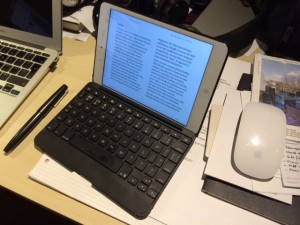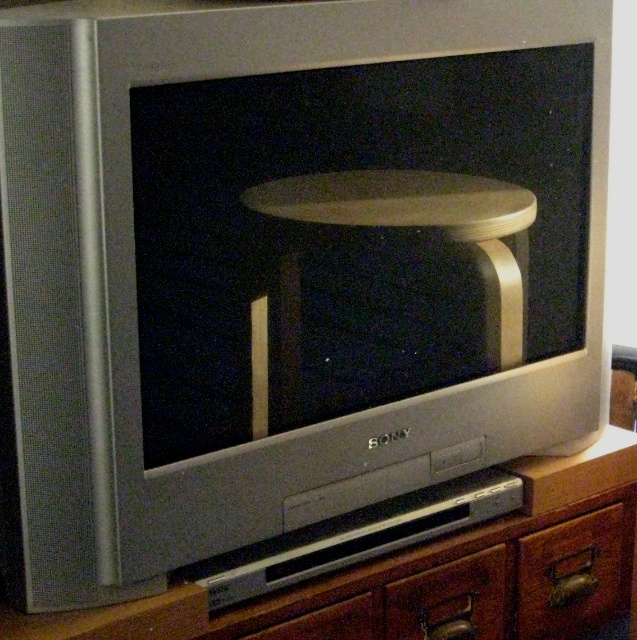On this day in 1982 the first commercial CD players appeared in UK stores.
The phablet controversy
Wading through the throng in an Apple store the other day, I had a look at the new iPhones. The iPhone 6 didn’t seem much of an advance on my 5s, but the even-bigger one, the 6 plus, seems odd. It’s far too big to be a credible phone, but too small to be a useable tablet. So why, one wonders, will people buy it?
One answer, I suppose, is that people buy preposterously large Samsung phones, even if they do wind up holding something the size of a dinner plate to their ears. (Or making calls surreptitiously, using headphones.)
Ages ago, I bought an iPad Mini with a SIM card for writing on the move, and kept my phone for texts and the occasional voice call. The Mini has turned out to be one of the most useful gadgets I’ve ever owned. Just big enough to be useful; just small enough to slip into a jacket pocket. The new iPhone isn’t a persuasive argument for abandoning that system. It ain’t broken, so I won’t be fixing it.
England’s green and pleasant land
Just driving along near where I live this morning and I suddenly noticed this vista. Nothing spectacular: just quietly beautiful.
Because it’s a panoramic shot the bigger version has more impact.
Hong Kong: two countries, one system
From Larry Lessig, commenting on the way the demonstrations in Hong Kong are being ‘policed’:
But this time, please, without the self-defeating trope that somehow this is a Right/Left issue. It is not. This is a Right/Wrong issue. It is wrong to allow a democracy to be captured by a tiny fraction of cronies. It is wrong here. It is wrong in Hong Kong. It is the democracy that Boss Tweed birthed (“I don’t care who does the electing, so long as I get to do the nominating.”) Which is to say, is the latest stage of a fundamentally corrupted democracy.
We should all stand with the students who launched the Hong Kong protests. And we should pray that it doesn’t become hijacked by violence — since this is China (Tiananmen) and because it is only ever nonviolent social movements that achieve the critical mass of support needed to win (that’s the brilliant conclusion of Erica Chenoweth’s work).
And the system is rotten to the core.
Surrealism
So is it good to talk… again?
This morning’s Observer column.
To the technology trade, I am what is known as an “early adopter” (translation: gadget freak, mug, sucker). I had a mobile phone in the mid-1980s, for example, when they were still regarded as weird. It was the size of a brick, cost the best part of a grand and exposed me to ridicule whenever I took it out in public. But I didn’t care because the last Soviet president, Mikhail Gorbachev, used the same phone and he was cool in those days. Besides, it had always seemed absurd to me that phones should be tethered to the wall, like goats. I still have that Nokia handset, by the way: it sits at the bottom of a drawer and I sometimes take it out to show my grandchildren what phones used to be like.
Over the decades since, I have always had latest-model phones – just like all the other early adopters. And of course I used them to make phone calls because basically that’s all you could do with those devices. (Well, almost all: one of mine had an FM radio built in.) And then in 2007 Steve Jobs launched the iPhone and the game changed. Why? Because the Apple device was really just a powerful computer that you could hold in your hand. And it was a real computer; its operating system was a derivative of BSD, the derivative of Unix developed by Bill Joy when he was a graduate student at Berkeley. (Note for non-techies: Unix is to Windows as a JCB is to a garden trowel.)
The fact that the iPhone could also make voice calls seemed, suddenly, a trivial afterthought. What mattered was that it provided mobile access to the internet. And that it could run programs, though it called them apps…
The light of other days
Quote of the day
“The law is just politics frozen in time.”
Marcus Raskin
After Magritte…
How to tweet a storm
Little Pork Chop is a lovely tool developed by — who else? — Dave Winer. You type your mini-essay into the text box, and the software then chops it neatly into bite-sized tweets and posts them in sequence. It’s a typical Winer creation — ingenious, elegant and useful. What a man!






